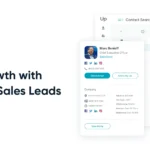
Are you ready to unlock the full potential of CRM (Customer Relation Management) development and revolutionize your business?
By implementing a robust CRM strategy, you can streamline processes, track sales leads, and improve profitability.
In this article, we’ll explore the importance of CRM and its impact on your success. We’ll delve into well-known CRM software examples, rapid prototyping in CRM development, security challenges, and the frontend and backend technologies used.
Key Takeaways
- CRM software allows companies to manage client interactions and relationships, streamline processes, track sales leads, and improve profitability.
- Rapid prototyping in CRM development helps identify design flaws early on, saving time and money.
- Security challenges in CRM development include SQL injection, XSS, CSRF, and insecure direct object references, which can be prevented through measures such as input validation, token usage, and data encryption.
- Frontend technologies like Angular, React, and Vue.js, and backend technologies like Java with Spring, Node.js, and Python with Django and Flask are commonly used in CRM development, based on factors like complexity, popularity, security, and availability of developers.
The Importance of CRM Strategy
To fully harness the benefits of CRM, you must align your business goals with a comprehensive CRM strategy. Implementing a cloud-based CRM system offers numerous advantages, such as increased flexibility, scalability, and cost-effectiveness.
Cloud-based solutions eliminate the need for on-premise hardware and software, allowing for easy access to information from anywhere at any time. Furthermore, they provide seamless integration with other business applications, enhancing overall productivity and efficiency.
When implementing CRM, it’s crucial to follow best practices to ensure success. This includes defining clear objectives, involving key stakeholders, and properly training employees on the system. Regularly reviewing and analyzing data, as well as continuously improving processes, are also essential for maximizing the benefits of CRM.
Benefits of Custom CRM Solutions
When implementing a cloud-based CRM system, it’s essential to consider the benefits of custom CRM solutions. Custom CRM solutions offer several advantages that can greatly enhance your business operations.
One key advantage of custom CRM solutions is personalization. By tailoring the CRM system to meet your specific requirements, you can ensure that it aligns perfectly with your business processes and goals.
Another advantage is scalability. Custom CRM solutions allow you to easily adapt and expand the system as your business grows. This flexibility ensures that the CRM system can accommodate changing needs and increased data volume.
Integration with other software and systems is also facilitated by custom CRM solutions. This enables seamless data flow and improved efficiency across different departments and functions.
Additionally, custom CRM solutions are easier to maintain and update. With a custom solution, you can easily incorporate new features and functionalities, ensuring that your system remains up-to-date with the latest CRM development trends.
Embracing custom CRM solutions can empower your business with a personalized, adaptable, and efficient CRM system. This, in turn, can drive innovation and success by providing the tools and capabilities needed to effectively manage customer relationships and improve business performance.
Well-known CRM Software Examples
You can explore popular CRM software examples such as Salesforce, Hubspot, PipeDrive, EngageBay, Zoho, Oracle on Demand CRM, Microsoft Dynamics 365, and SAP CRM. These CRM software options offer various features and customization advantages to cater to your specific business needs. To help you compare these CRM software options, refer to the table below:
| CRM Software | Features | Customization Advantages |
| Salesforce | Sales and marketing automation, customer service, analytics | Highly customizable with extensive third-party integrations |
| Hubspot | Marketing automation, lead management, email tracking | Easy to use and customizable with pre-built templates |
| PipeDrive | Sales pipeline management, email integration, reporting | Flexible and customizable to fit your sales process |
| Zoho | Sales and marketing automation, customer support, analytics | Highly customizable with a wide range of apps and integrations |
These CRM software examples provide innovative solutions for managing client relationships and improving business processes. By comparing their features and customization advantages, you can choose the CRM software that aligns with your organization’s goals and requirements.
CRM Software & Services- Is EngageBay worth considering? Read Here
Leveraging Rapid Prototyping in CRM Development
Leverage rapid prototyping in CRM development to enhance design efficiency and minimize potential flaws.
Rapid prototyping offers numerous benefits in CRM development, improving efficiency and driving innovation. By creating prototypes and gathering feedback early in the design process, you can identify and address any flaws or shortcomings before investing time and resources into actual development. This approach saves both time and money, ensuring that the final product meets the needs and expectations of your clients.
Rapid prototyping also encourages collaboration and involvement from the entire team, fostering a sense of ownership and shared responsibility. Tools such as Balsamiq, MockFlow, and UXPin can be used to facilitate the rapid prototyping process, enabling quick iterations and continuous improvement.
Security Challenges in CRM Development
To effectively address security challenges in CRM development, it’s crucial to implement robust measures that safeguard against potential vulnerabilities.
In today’s data-driven world, protecting CRM data analytics is of utmost importance to ensure the confidentiality and integrity of customer information.
CRM implementation challenges can arise due to various factors, including the complexity of integrating different systems and the need for seamless data migration.
By adopting a strategic approach to security, you can mitigate risks and protect sensitive customer data. Implementing measures such as input validation, parameterized queries, and output encoding can help prevent common security threats like SQL injection and cross-site scripting.
Additionally, employing data encryption techniques and utilizing servers behind a VPN can enhance the safety of data transmission and protect against potential attackers.
What is CRM integration and customization and its importance for a business- Read Here
Ensuring Data Security and Confidentiality
Implementing robust security measures is essential for safeguarding the data analytics of your CRM system and ensuring the confidentiality and integrity of customer information.
To achieve this, data encryption plays a crucial role in protecting sensitive data from unauthorized access. By encrypting data at rest and in transit, you can prevent unauthorized individuals from gaining access to customer information.
Additionally, preventing SQL injection is equally important. By implementing input validation and using parameterized queries, you can minimize the risk of SQL injection attacks that can compromise the security of your CRM system.
Regular security audits and vulnerability assessments should also be conducted to identify any potential weaknesses and to ensure that your CRM system remains secure.
CRM Development With Frontend Technologies
How can you effectively enhance CRM development using frontend technologies? Frontend technologies play a crucial role in enhancing CRM development by improving user interface design and overall user experience. By utilizing frontend frameworks such as Angular, React, and Vue.js, developers can create visually appealing and intuitive websites for CRM applications. These frameworks offer a wide range of features and tools that simplify the development process, increase productivity, and ensure scalability.
Additionally, frontend technologies enable the integration of interactive elements, responsive design, and seamless navigation, resulting in a more engaging and efficient CRM system.
| Frontend Frameworks | Features |
| Angular | – Two-way data binding <br> – Dependency injection <br> – Component-based architecture |
| React | – Virtual DOM for efficient rendering <br> – Component reusability <br> – One-way data flow |
| Vue.js | – Lightweight and easy to learn <br> – Reactive and declarative syntax <br> – Seamless integration with existing projects |
CRM Development With Backend Technologies
You can optimize CRM development by leveraging the power of backend technologies. When it comes to backend technology comparison, there are several factors to consider.
First, consider the complexity and scalability of your CRM solution. Java with the Spring framework is a popular choice due to its robustness and ability to handle complex systems. Node.js, on the other hand, offers high performance and scalability for real-time applications. Python with Django and Flask frameworks is known for its simplicity and ease of development.
Additionally, consider the availability of developers and libraries for each technology.
Factors to Consider in Choosing the Right Technologies
Considerations for selecting the appropriate technologies in CRM development include compatibility, scalability, and developer support. When choosing the right technologies, it is crucial to consider factors that align with best practices in CRM implementation. Here are some key factors to consider:
| Factors | Description |
| Compatibility | Ensure that the technologies you choose are compatible with your existing systems, databases, and infrastructure. This will facilitate seamless integration and data sharing |
| Scalability | Choose technologies that can scale with your business growth. The CRM solution should be able to handle increased data volume, user traffic, and functionality requirements |
| Developer Support | Opt for technologies that have active developer communities and robust support resources. This will ensure that you have access to expertise, updates, and troubleshooting assistance when needed |
| Security | Prioritize technologies that offer robust security features and follow industry standards to protect sensitive customer data |
| Innovation | Look for technologies that offer innovative features, such as AI and machine learning capabilities, to enhance your CRM implementation |
CRM Developers & Their Role
CRM developers play a pivotal role in shaping the efficiency and effectiveness of Customer Relationship Management (CRM) systems. Their primary responsibility revolves around designing, customizing, and implementing CRM solutions tailored to meet specific business needs.
These professionals possess a blend of technical expertise and a profound understanding of customer-centric strategies, allowing them to bridge the gap between technology and customer satisfaction.
Roles of CRM Developers:
1. System Customization
CRM developers are adept at customizing CRM platforms to align with a company’s unique requirements. They configure the system’s functionalities, workflows, and interfaces to optimize user experience and streamline processes.
2. Integration Expertise
Their role often involves integrating CRM systems with other tools or databases, ensuring seamless data flow across different platforms. This integration enhances data accessibility and accuracy, contributing to informed decision-making.
3. Coding & Development
These experts delve into coding and development to create custom modules, plugins, or applications that complement the CRM system. They leverage their coding skills to enhance functionalities and address specific business needs that off-the-shelf solutions may not cover.
4. Troubleshooting & Maintenance
CRM developers also troubleshoot issues, perform system upgrades, and ensure the smooth functioning of the CRM environment. Their proactive approach helps in resolving technical glitches and maintaining system integrity.
CRM developers are the architects behind a robust CRM ecosystem, essential in fostering strong customer relationships and driving business growth through optimized technology solutions.
Would you need a CRM Developer?
In today’s economy, businesses across various models can benefit significantly from CRM developers’ expertise. Consider these scenarios:
1. Small to Medium Enterprises (SMEs)
- Tailored Solutions: SMEs aiming for growth can leverage CRM developers to create bespoke CRM systems. Customization ensures alignment with their specific processes and scalability as they expand.
- Cost-Effective Integration: Hiring a CRM developer can be cost-effective for SMEs, as they can integrate CRM solutions into existing systems without the need for expensive, full-scale replacements.
2. E-commerce Ventures
- Enhanced Customer Experience: E-commerce businesses thrive on customer interactions. CRM developers can create systems that track customer behaviors, improving personalization and loyalty.
- Integration with Marketing Tools: Integrating CRM with marketing tools streamlines campaigns, targeting the right audience, and analyzing results for better ROI.
3. Service-Oriented Businesses
- Efficient Customer Service: For service-based businesses, a tailored CRM system can streamline client communication, manage appointments, and track service histories, enhancing overall service quality.
- Data-Driven Decision-Making: CRM systems developed for service businesses can collect valuable data on customer preferences and service usage, enabling data-driven decisions.
4. SaaS (Software as a Service) Companies
- Customization for Clients: SaaS companies can benefit from CRM developers by offering customizable CRM modules to their clients, providing added value and meeting specific user needs.
- Integrating CRM within SaaS Platforms: Integrating CRM functionalities within their software can boost customer retention and satisfaction for SaaS providers.
Considering these scenarios, businesses seeking enhanced customer relationships, streamlined processes, and data-driven decision-making could find immense value in engaging a CRM developer to optimize their CRM systems.
Wrapping Up
In conclusion, CRM development is a crucial aspect of maximizing business potential. By implementing a robust CRM strategy and utilizing custom CRM solutions, businesses can streamline processes, track sales leads, and improve profitability.
Rapid prototyping helps identify design flaws early on, saving time and resources. Addressing security challenges and utilizing frontend and backend technologies further enhance the CRM system’s efficiency.
So, whether one should go with a CRM software or hire a developer for more customization options is up to one’s business strategy, budget, & business agenda, but to achieve the excel, CRM development is the must that no one can ignore today.
Wishing you success!
Frequently Asked Questions (FAQ)
What Are the Common Security Challenges in CRM Development and How Can They Be Addressed?
Common security challenges in CRM development include SQL injection, XSS, CSRF, and insecure direct object references. Address them through input validation, parameterized queries, output encoding, token usage, access controls, data encryption, VPN usage, and cloud hosting for data privacy and CRM integration.
What Are the Benefits of Using Custom CRM Solutions?
Using custom CRM solutions offers numerous benefits. You can personalize the system based on your specific requirements, scale it as your business grows, integrate it with other tools, improve efficiency, and ensure easier maintenance.
Can You Provide Examples of Well-Known CRM Software?
Sure, here are some examples of popular CRM software: Salesforce, Hubspot, PipeDrive, EngageBay, Zoho, Oracle on Demand CRM, Microsoft Dynamics 365, and SAP CRM. These top CRM solutions are widely used in the industry.
What Frontend and Backend Technologies Are Commonly Used in CRM Development and How Do They Impact the Overall Development Process?
Frontend technologies like Angular, React, and Vue.js, along with backend technologies like Java with Spring, Node.js, and Python with Django and Flask, play a crucial role in CRM development, impacting the overall process by providing user-friendly interfaces and efficient data management capabilities.
How crucial is a CRM developer for my business?
A skilled CRM developer can significantly impact your business by optimizing CRM systems to enhance customer relationships, streamline processes, and enable data-driven decision-making.
What are the benefits of hiring a specialized CRM developer?
Specialized CRM developers bring expertise in creating customized solutions that align precisely with your business processes, leading to improved efficiency, enhanced customer satisfaction, and better decision-making based on data insights.
Can I hire a freelance CRM developer or should I opt for a company?
Both options have their merits. Freelancers can offer cost-efficiency and flexibility, while companies often provide a team with diverse expertise and consistent support. Assess based on your project scale and requirements.







